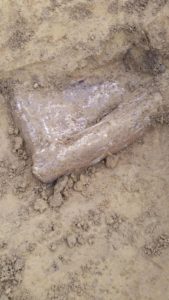 A group of military veteran metal detectorists have discovered a hoard of 250 Roman coins and a Roman lead coffin in Ilminster, Somerset, England. Detecting for Veterans assembled in an Ilminster field (the exact location is not being disclosed for its protection) this year for its annual Christmas charity dig in aid of The Veterans Charity and Talking2Minds. Member Kevin Minto made the first modest finds — a button, a fragment of lead — and then hit the jackpot when he found a Roman coin.
A group of military veteran metal detectorists have discovered a hoard of 250 Roman coins and a Roman lead coffin in Ilminster, Somerset, England. Detecting for Veterans assembled in an Ilminster field (the exact location is not being disclosed for its protection) this year for its annual Christmas charity dig in aid of The Veterans Charity and Talking2Minds. Member Kevin Minto made the first modest finds — a button, a fragment of lead — and then hit the jackpot when he found a Roman coin.
Being a responsible and conscientious metal detecting enthusiast, the group founder, former 1st Battalion Light Infantry Veteran, Jason Massey immediately called the county Finds Liaison Officer to determine how to proceed without harming the archaeological context. He was told an archaeological team would be on the way, but to continue to detect and dig, but to be cautious and document everything he found.
 Over the next four days, Detecting for Veterans worked the field assiduously, ultimately unearthing 260 Roman coins ranging in date from 270-305 A.D., and one ring and two brooches. They were then joined by the Somerset County archaeologist Bob Croft and discovered the Roman grave site. The lead coffin dates to around 400 A.D. and archaeologists believe it a young woman’s coffin. This is an extremely rare find; just six lead-lined Roman coffins have been discovered in Somerset. Only 200 have been found in the entire country.
Over the next four days, Detecting for Veterans worked the field assiduously, ultimately unearthing 260 Roman coins ranging in date from 270-305 A.D., and one ring and two brooches. They were then joined by the Somerset County archaeologist Bob Croft and discovered the Roman grave site. The lead coffin dates to around 400 A.D. and archaeologists believe it a young woman’s coffin. This is an extremely rare find; just six lead-lined Roman coffins have been discovered in Somerset. Only 200 have been found in the entire country.
Laura Burnett, the Somerset finds liaison officer, said lead was a “fancy and expensive” way of being buried in Roman times.
“They’re probably using locally produced lead from the Mendips – so it might have been a bit cheaper here than in other parts of the county – but it’s an expensive thing to be buried in.” […]
There are about 200 similar lead coffins finds in the country but only six have been previously been discovered in Somerset.
“This is a very special site, a rare discovery of lead coffins,” Mr Croft said.
“Lead ones that we know go from Shepton Mallet to Wiveliscombe, and this central part of Somerset – so this one is an unusual one.
 If the hoard is declared treasure trove (and it will be), local museums will be given the opportunity acquire it for the amount of its official valuation which will be divided between the finder and the landowner. That would make a great gift for the charities supported by Detecting for Veterans.
If the hoard is declared treasure trove (and it will be), local museums will be given the opportunity acquire it for the amount of its official valuation which will be divided between the finder and the landowner. That would make a great gift for the charities supported by Detecting for Veterans.
Archaeologists are still exploring the site and plan to continue into 2018.